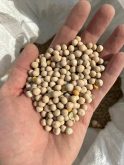Lower commodity and fertilizer pricing offset a record grain handle to lighten the bottom line for 2009 at Canada’s largest grain company.
Viterra on Thursday posted profit of $113.1 million on $6.64 billion in revenues in its fiscal year ending Oct. 31, including 38 days’ contributions from its newly-acquired Australian arm, the former ABB Grain, from Sept. 24 onward.
That’s down from $288.3 million profit on $6.78 billion in revenues in fiscal 2008. Earnings per share in 2009 drop to 45 cents from $1.31.
Meanwhile, Viterra’s results for its fourth quarter ending Oct. 31 show a net loss of $920,000 on $1.42 billion in revenues, down from a profit of $46.8 million on $1.72 billion in revenues in the year-earlier period.
Read Also

Selling GMO tomato seeds to Canadian gardeners ‘reckless’ say advocates
Selling genetically-modified purple tomato seeds to home gardeners could raise the risk of contamination of organic vegetable varieties and hamper farmers’ ability to save their own seed, say a group of advocates.
The Regina-based company shipped 17 million tonnes of grains and oilseeds in 2009, marking an all-time record for its North American operations. But its 2009 ledger also records “a leveling of gross margins per tonne and the impact on contributions from a significant decline in fertilizer margins.”
In 2009, with the ABB deal sealed, “we executed a $1.4 billion transaction and, as promised, retained a very strong capital structure with over $1 billion of cash and short-term investments on our balance sheet,” CEO Mayo Schmidt said in the company’s release Thursday, noting about $800 million remains available for “future growth initiatives.”
Viterra noted its farmer customers, faced with record-high fertilizer prices in 2008, chose to cut back their applications in 2009, mindful of softening grain and oilseed prices.
“With three-year lows on fertilizer prices today and historically favourable projected returns, management’s expectations are that growers will return to more normal fertilizer usage rates to replenish their soil nutrients this coming year,” the company said.
But whether fertilizer use rebounds and fertilizer prices rise as a result this spring “will be dependent on global commodity supply and demand fundamentals,” Viterra said.
The company described its record grain handle in 2009 as a reflection of its ability to handle a larger-than-average crop due to its “significant” inland terminal capacity; “strong execution” of its open market export program, particularly through Vancouver; a “solid” Canadian Wheat Board export program; and “ample” railcar supply due to a slowdown in other freight sectors — for example, potash.
“Liquidity management”
In a separate release Thursday, Viterra announced it would pay down $300 million in short-term debt owed by its Australian operations by the end of this month, using surplus cash in order to reduce the seasonal draw on its A$1.2 billion operating credit facility.
The $300 million debt reduction is expected to cut Viterra’s monthly interest expenses by about $1.3 million per month.
“At year-end, we had over $1 billion in cash and short-term investments on our balance sheet, of which approximately $800 million is available for other uses,” Viterra CEO Rex McLennan said in Thursday’s release. “This is a prudent course of action, consistent with our global focus on operations and liquidity management.”
Viterra noted that the move won’t impact availability of funds through the A$1.2 billion credit facility, and funds are expected to remain in place until needed to support the company’s “future growth plans.”














